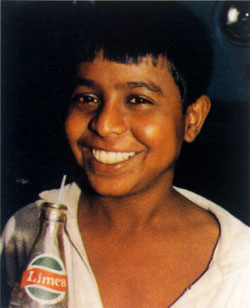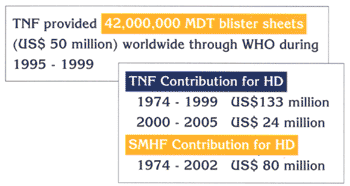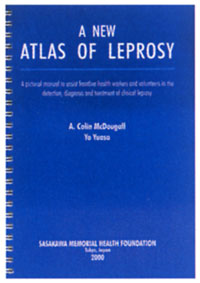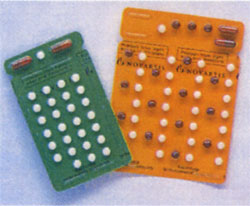|
Hansen's Disease-Elimination
SMHF views it more appropriate to deal with HD, not as a separate and independent phenomenon, but rather within the context of all health issues of developing countries. The foundation considers that final responsibility for public health issues should rest with national governments with people. Therefore it believes in coordinating its resources and expertise in such a way as to assist the efforts of the countries themselves to deal with the issues. With this concept as its guiding principle, SMHF collaborates with governments, international agencies such as WHO. and with NGOs such as the International Federation of Anti-Leprosy Associations (ILEP). Together, these partners devise and execute plans for the global elimination of HD.
At the 44th World Health Assembly of 1991, the member states unanimously pledged to eliminate HD, as a public health problem, by the year 2000, defining "elimination" as the reduction of prevalence to a level below one case per 10,000 in the population. The governments of HD-endemic countries, international agencies and NGOs worldwide began to coordinate their efforts to achieve this target. SMHF, in association with WHO and ILEP, has supported HD control activities in endemic countries in Asia, South America and Africa.
WHO and its partners announced in May 2001 that the overall target, set ten years ago in 1991, for the elimination of HD as a public health problem has been attained at global level. However, that target at the national level has eluded in 6 countries: India, Brazil, Myanmar, Madagascar, Nepal, and Mozambique. The partners in the Global Alliance are committed to maintaining the momentum of HD elimination until 2005, when every country in the world is expected to achieve the target of elimination.
|
Endemic Countries
|

|
SMHF has established a working relationship with WHO and ILEP. These two linkages with the agencies which had long experience in HD work greatly helped the foundation, not only in teaching us how to work in international arena of collaborative and sometimes competing work, but also in showing us how to avoid pitfalls like duplication or wasting of resources.
At the 1st International Conference on the Elimination of Leprosy held in Hanoi in 1994, which the foundation cosponsored with WHO, Mr. Yohei Sasakawa, president of TNF, made an announcement of US$50 million contribution to WHO, to ensure free supply of MDT (Multi Drug Therapy) drugs over the 5-year period.
SMHF's support to the endemic countries have been closely tied to the implementation and further expansion of MDT programmes since 1982, when WHO recommended MDT in the field. Our current priority is to make sure that the ongoing "Elimination" programme succeeds in making HD no longer a public health problem.
 |
| after MDT |

|
 |
| A pictorial manual to assist frontline health workers and volunteers in the
detection, diagnosis and treatment of clinical leprosy. |
 |
| blister sheet |
Hansen's Disease - Socio-Economic Rehabilitation
HD has been known as a disfiguring disease and because of this, many patients suffer severe stigmatisation and prejudice even after being cured. Now that HD has become curable, without residual deformity when treated early, the social concept of HD has to change, and the cured individuals should be able to find their due places in society. However, innovative approaches are needed to change the image of HD, and thus to permit the recovery of the human dignity of those who are cured.
SMHF has worked closely with organisations which operate on the principle that the stigma associated with HD and the accompanying social isolation will only be eliminated when those who have personally experienced this disease have regained the identity, self-confidence and dignity that is all too often taken away from them by the disease and society's treatment of them. In this regard, SMHF encourages the initiatives and leadership by the people affected by HD. To this goal, SMHF supports activities;
・ to provide socio-economic rehabilitation assistance
・ to provide scholarships to children disadvantaged by HD
・ to hold empowerment workshops
・ to promote positive image of HD, and
・ to provide the platform to voice their thoughts and ideas
Socio-Economic Rehabilitation
People affected by Hansen's Disease do not need charity, but the opportunity to show
we are capable and, in so doing, perhaps change the world
Cristiano Torres, Brazil
SMHF has funded organisations run skills training courses and provided initial costs to facilitate micro enterprises for self-employment for those who had HD in order to enable individuals to regain economic autonomy in China, India and Ethiopia.
Our assistances include;
training courses in sewing, machine repair, pig-, chicken-, goat-, and goose farming, shoe-, bicycle repair, weaving, food stall and others.
Scholarships
Education is a key factor to promote inclusion in the community and prospects for future employment. It helps break the cycle of poverty and social exclusion often experienced by the people as well as the family of those who have had HD. SMHF has provided scholarships to children in Nepal, India, China, and Myanmar.
When I got the money from you, I treated it as a piece of jewellery... I know this money did not come in an easy way. We need to catch the chance to study hard and in the future make benefit to our society
He Miao Chong, China
Empowerment Workshops
Advocacy and capacity building workshops are conducted to work for the empowerment of people affected by HD. It is to provide opportunities for self-expression and discussions with health professionals and government officials, through which the needs are identitied and the actions are decided by their initiatives. This helps reduce the stigma and provide opportunities for the people affected by HD to improve their lives.
Public Advocacy Programmes
SMHF has supported activities to promote positive images of HD and the people affected by the disease through publications of books, posters and other materials which stress their achievements, highlight their abilities, and recognise challenges, and celebrate personal victories.
|